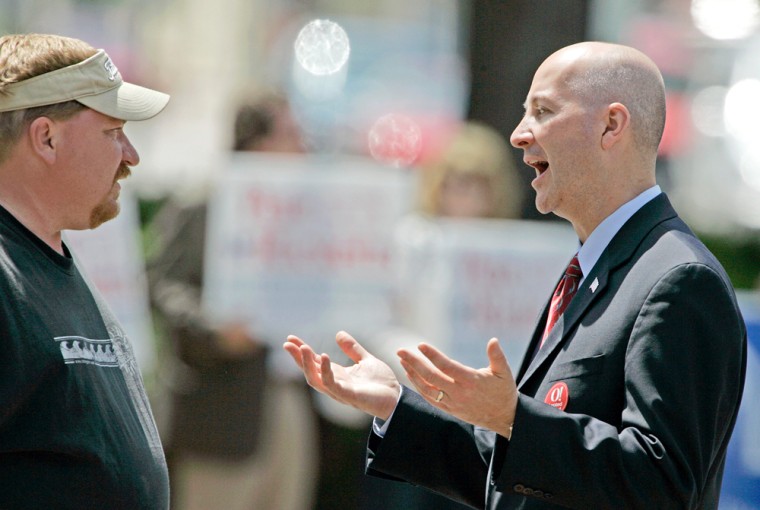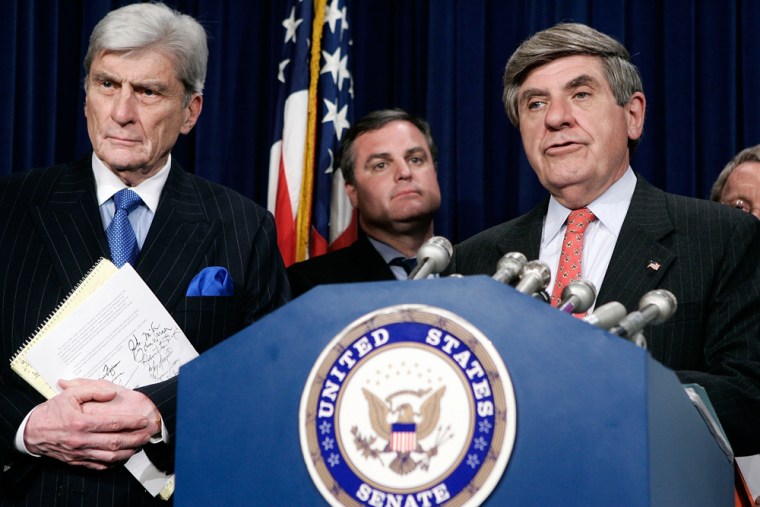Senate Republicans are under siege. Analysts say Republican senators in Pennsylvania, Rhode Island, Ohio, Montana, and Missouri are at risk of losing their seats and eroding the GOP’s 55-seat majority.
With the party looking to offset possible losses on Nov. 7, Republican strategists are taking aim at Nebraska, where GOP novice Pete Ricketts is running against incumbent Sen. Ben Nelson, a Democrat.
Ricketts, a former executive with the Omaha-based brokerage firm Ameritrade, has invested nearly $5 million of his personal wealth to beat two rivals in the GOP primary. He may spend another $5 million in the campaign against Nelson.
It makes sense here. Nebraska isn’t an environment where Democrats naturally flourish. In 2004, only 32 percent of Nebraska’s voters cast ballots for Democrat John Kerry.
But is the Ricketts-Nelson battle a genuine race — or are Republicans trying to force Democrats to spend money here that would be better spent in races elsewhere?
The answer depends almost entirely on first-time candidate Ricketts.
The Democrat's most conservative senator
Since Nelson — who served two terms as governor and who is now the most conservative of all Senate Democrats — is a known quantity in Nebraska, it will be up to Ricketts to do something to make this a horse race.
Nelson is a consummate survivor. He won the 1990 gubernatorial primary — against six other candidates — by a mere 42 votes, after two recounts. He came back from badly losing a Senate race in 1996 to Chuck Hagel to win the state’s other Senate seat in 2000.
But Nelson won in 2000 only after outspending his Republican opponent, Don Stenberg, by $1 million, and he managed to beat him by only 51 percent to 49 percent.
According to the non-partisan Congressional Quarterly ratings, last year Nelson supported President Bush on Senate roll call votes 76 percent of the time — making him a more steadfast Bush loyalist than Republican senators, Lincoln Chafee of Rhode Island, and Susan Collins and Olympia Snowe, both of Maine. Nelson has the same Bush-support rating as Republican Sen. Mike DeWine of Ohio.
“I’ve made sure the other side doesn’t define me; I define myself,” Nelson said. “I don’t want to ban the Bible; I don’t want to burn the flag; I don’t want to take away the guns; I’m not promoting same-sex marriage; I don’t want to re-write the Pledge of Allegiance; I am not supportive of abortion.”
And these aren’t mere words. Nelson has voted:
- For Bush’s Supreme Court nominees Samuel Alito and John Roberts;
- Against every Democratic filibuster of Bush judicial nominees in 2002-2003, except one;
- For Bush-supported tax cuts in 2001 and 2003;
- Against a resolution declaring that the Roe v. Wade abortion legalization ruling “secures an important constitutional right” and “should not be overturned;”
- Against Democrats’ efforts to prevent a Senate floor vote on a constitutional ban on same-sex marriage.
Two weeks ago, Nelson was one of only three Democrats in the Senate to vote for continuing lower tax rates on capital gains and dividends.
Motivated by majority: A politics/party dilemma
Sen. Charles Schumer, D- N.Y., heads the Democratic Senatorial Campaign Committee which is backing Nelson’s re-election. But Schumer denounced the extension of lower tax rates, saying that the three Democrats who voted for it "made a decision that I disagree with, but I don’t think it’s going to play much of a role in those races because people want change and they realize that having Democrats in charge will make that change.”
But Brian Nick, communications director for the National Republican Campaign Committee, said a “change” election would mean electing Ricketts, not keeping the incumbent.
“Nelson has been in office both as governor and as senator for quite some time. It’s a very good year to be running as an outsider,” Nick contended.
Meanwhile Nelson refutes Schumer’s change scenario: “My votes have been the same regardless of who has been in charge,” he said. “Voters know that it won’t matter who is the majority leader.”
Why is Ben Nelson a Democrat?
Given Nelson’s voting record, two questions arise: Why is he a Democrat? And what reason would a Republican have to vote against Nelson?

Nelson answers the first question this way: “Democrats may not always be right, but they always try to be on the right side, whether it was Medicare, Social Security, civil rights, voting rights.” He added, “I’ve never been pushed by the Democrats to leave the Democratic Party. While I have had overtures from Republicans (to switch parties) I’ve concluded that I’m very comfortable where I am.”
The Republican effort to induce Nelson to switch parties was, of course, aimed at adding to and protecting the GOP majority in the Senate. Having failed to lure Nelson across the aisle, Republicans will now try to unseat him.
From the point of view of the Republican party, the beautiful thing about Ricketts is that he is independently wealthy and can self-finance his campaign. Money from the national party and GOP donors will not have to be used in Nebraska and can be deployed to defend Republican seats in Ohio and elsewhere.
Ricketts, like other self-funded candidates such as Democrat Jon Corzine in 2000 and Republican Pete Coors in 2004 is a boon to his party.
Conversely if Ricketts catches fire, Democratic money will need to be diverted to save Nelson.
A conservative vote either way
Ricketts had this answer to why — despite Nelson’s conservative voting record — Republicans shouldn’t vote for Nelson: “One of the biggest things we need to do is get the spending under control… Ben Nelson has said he is in favor of earmarks. To me earmarks helped create and foster that culture that says, ‘I’m not going to hold you accountable for your pork-barrel projects if you don’t help me accountable for my pork-barrel projects.’ If we’re going to get our spending under control.… we need to start with earmarks as one thing we’re going to reform.”
But Nelson campaign communications director Marcia Cady responded that Ricketts did not understand the budget process, of which earmarks were part. Nelson sought federal money to go to “necessary and worthwhile projects for communities in Nebraska,” Cady said, citing as an example an earmark spending item Nelson secured in 2003: $2.3 million for the Nebraska State Patrol to combat methamphetamine trafficking.
Perhaps the most curious wrinkle so far in this race is that on immigration. Nelson has taken stands further to the right than Ricketts has.
Nelson voted last week to ban “guest workers” from becoming legal permanent residents of the United States, which would make them eligible for citizenship. Nelson was one of only three Democrats to vote for this proposed ban, which the Senate rejected by a vote of 58 to 37.
He was also one of only two Democrats to vote against giving illegal immigrants a pathway to citizenship. The vote was 66-33, with Nelson on the losing side.
In contrast, Ricketts said illegal immigrants should be given the chance to become legal residents and eventually naturalized citizens. He called this a “pragmatic” approach.
A Coors comparison
Ricketts calls to mind another wealthy, self-financed Republican Senate candidate, Coors, who ran two years ago in Colorado.
In his loss to Democrat Ken Salazar, Coors demonstrated the errors that a beginner candidate who comes from the business world can make. He never seemed completely in command or at ease as a campaigner.
Is Ricketts another Pete Coors?
In person, Ricketts seems more engaged and intense than Coors; seems to take a wonkish interest in policy and has a brisk alertness. The age difference — Ricketts is 41, Nelson is 65 — may work to Ricketts’ advantage.
But much hinges on how he handles himself in debates.
Nelson has launched an offensive against Ricketts, pointing to his interest in exploring a consumption tax which Nelson charged “would raise taxes on 95 percent of Nebraskans.”
Ricketts responded that “we need to take a look at things like the consumption tax or the flat tax” and that such systems could be designed that would give tax credits or rebates to lower-income people so they wouldn’t be hit with a new tax burden.
